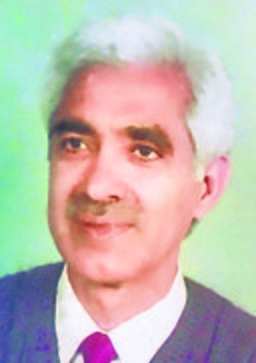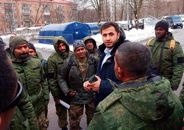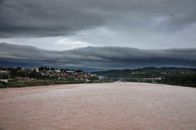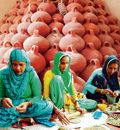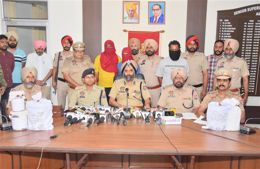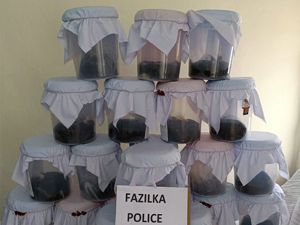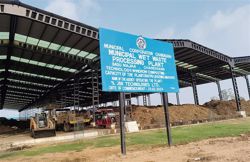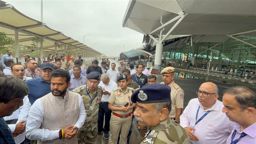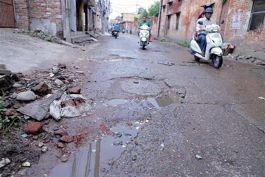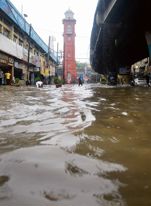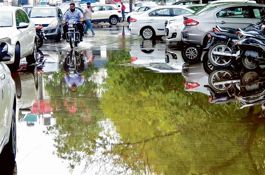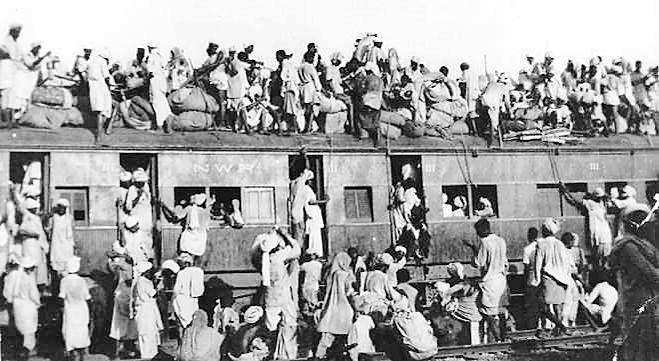
DR Gambhir
Our village Channi, which was located in Sargodha district in Pakistan, remained peaceful for quite some time, even though lootings and killings had started in the nearby villages in 1947. I was eight years old then. My father, Mool Chand, was an agriculturist. He had a close friendship with the village head, Mian Daad, whose house was next to ours. We would call him Daad Uncle. He was an influential person, just like my father. Around September, incidents of arson had spread to many villages closeby. Many of our relatives there started coming to our haveli for safety. Daad Uncle, who was aware of this, advised my father that everyone in the haveli should remain alert of any miscreants coming from the nearby villages. Our relatives gathered sticks and spears for self-defence. Some days passed peacefully but one night, some miscreants from a neighbouring village attacked the haveli. They threatened us to open the gate. They then tried to break it open. The people on our side threw some bricks at them from inside the haveli. Some of the miscreants left the gate and tried to climb the wall. Two of them were successful. Within no time, they were overpowered. When they cried for help, the other miscreants, sensing trouble, ran from there. Our people lynched the intruders. Apprehending more serious attacks, Daad Uncle met my father the next day and suggested that we should move to the Sargodha camp, which was being managed by the army. My father agreed. Daad Uncle arranged for two army trucks. In the first trip, our relatives were sent to the Sargodha camp, while we left in the next round.
We stayed at the camp for about 10 days. Life there was tough. Food was served by NGOs. Some were able to get food, others were not so lucky. My mother was pregnant at that time.
Here Daad Uncle came to see us. He was in tears when he met my father. He had brought some kitchen utensils for us to carry on our journey. He went back with a heavy heart after hugging my father.
My younger sister was four years old at the time. My father would give an evasive reply whenever she asked him when she could go back home and rest on her bed. There seemed no end to the tough times. One day, we received a message that by evening, we would be taken to the railway station. We boarded the train to Amritsar. Escorted by the army, the train left at night. We heard heart-rending stories of Hindus and Sikhs being massacred on trains leaving Pakistan. Around midnight, the train was stopped at a small railway station. As soon as the miscreants rushed towards the compartments, the army men opened fire in the air. But the mob did not relent. Then the army personnel fired at them. Some of the miscreants fell on the platform, while many escaped. The situation was soon brought under control and the journey resumed.
Early morning, we reached Amritsar, unharmed. There, we were informed that migrants from Sargodha district were being settled in Ambala district. We boarded the train for Ambala. The train ride was not dangerous any longer. The fear of being looted and massacred was over. Many langars had been set up at railway stations for the refugees all along the way. The train journey came to an end at Ambala Cantonment. Once again the treacherous camp life started.
We were put up in tents that had been set up along the railway line. All of us were disheartened, especially my sister, whom we lovingly called Guddi. She repeatedly kept pleading while crying, “Apne ghar chalo” (Let us go home). My father was helpless. The family was worried about this little girl. One night, Guddi got very unwell but kept uttering, “Apne ghar chalo.” She was given full attendance but it was of no use. My father felt her pulse. His tears revealed that she had departed for home. The family was badly shaken. The child was cremated near the camp.
When we returned to our tent, we found my friend’s father, Haveli Ram, son of Khan Chand Dawar of Doda village near Channi, waiting for us. He told my father that we had been allotted a house in Sountli village where they had also been allotted a house. He had come with a truck. With a heavy heart, we set out for the hour-long journey to Sountli.
Next came the task to re-establish ourselves. My father did not lose heart. He tried his best to encourage us, saying that we would again get established like we were in Channi. Meanwhile, we got some agricultural land at Sountli in lieu of the land left by us in Channi.
I took admission in Class II at Government Middle School in Shahzadpur, 3 km from Sountli. We were no longer taught in Urdu here but in Hindi, which I learnt easily. There was, however, one major embarrassment. My classmates did not call me by name but would address me as ‘Refugee’ or ‘Pakistani’. Thankfully, this did not continue for long. After school at Shahzadpur, I went to Ambala Cantonment for further studies. I joined government service and helped my family in the rehabilitation process, which was an enormous task. It took us many years to recover but we all worked very hard. In 1965, I got married to Parmeshwari Devi, sister of Haveli Ram. I retired as an Assistant Executive Engineer from the Punjab State Electricity Board. My father passed away in 1964 and mother in 1980.
I still remember the tragic events of Partition like these took place yesterday. Life at the camp was treacherous. The death of my younger sister haunts me even today, as does the news about the massacre of Hindus and Sikhs, and even burning of their houses in Pakistan. I fervently hope that there will never be such ghastly scenes again.
— The writer is based in Ambala Cantt
Join Whatsapp Channel of The Tribune for latest updates.






